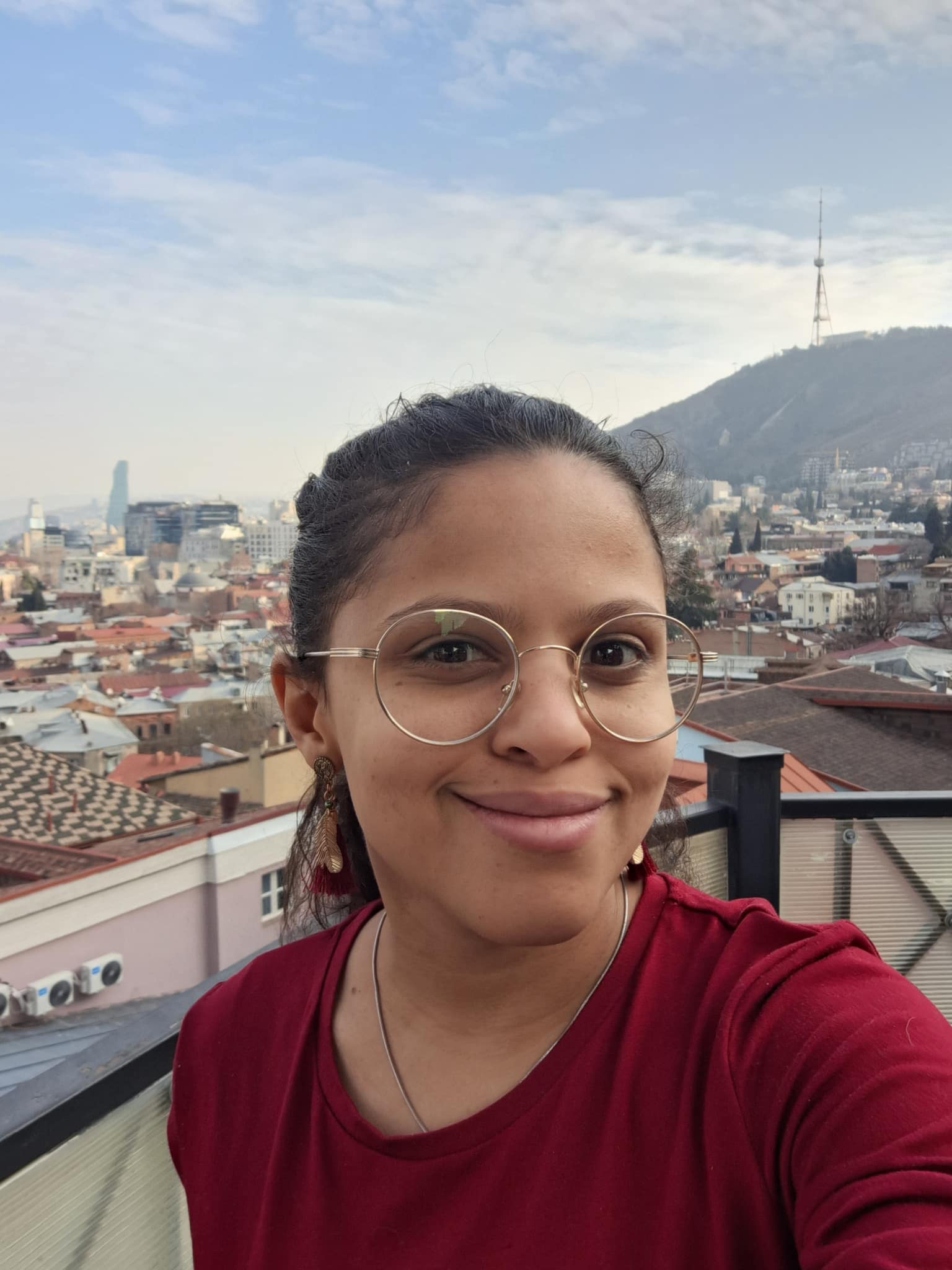No one intends to stay. I certainly didn’t when I first arrived. In truth, I didn’t even really want to come to Tbilisi in the first place. My arrival to the city was purely out of obligation—for work—and beyond the two months of my assignment, I had no plans of prolonging my time here. So, during that first week in the city, I remained skeptical when my roommate regaled me with tales about the supposed allure and spell that Tbilisi has over its visitors.
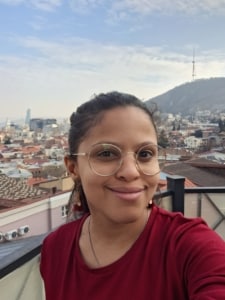
Time and my current residency card have proved that my roommate was correct.
It’s been seven years now since I arrived. During that time, I married a Georgian, taught drama at an international school, earned a master’s degree, and most recently became a program manager at SRAS. The crux of my role is developing and managing programs in the Caucasus, including Batumi and Tbilisi in Georgia as well as Yerevan, Armenia. What I find most rewarding in my job is helping students in the program experience Tbilisi as I have.
So, what do I like about living in Tbilisi? What is so magical about this city? In this article, I will list a few of the many reasons why Tbilisi has captivated and kept me here for so many years.
Ezos and Entryways
On that first cab ride from the airport into the city, something most notable in Tbilisi is the visible clash between medieval and modernity. The city’s skyline is a smorgasbord of 12th-century monasteries, Soviet-era Khrushchevka apartment blocks, and glass skyscrapers. And somehow, it works.
I find the real charm of Tbilisi’s architecture to be not what is visible on the horizon but rather what is tucked away in the corners of its various neighborhoods.
One of Tbilisi’s hallmarks is the ezo (ეზო)—a courtyard surrounded by buildings characterized by multi-story balconies and communal atmosphere. These courtyards are scattered throughout the city but are mainly in Sololaki, Vera, and Chugureti. From my experience of living in an apartment with an ezo, I can say that this is a tangible aspect of Tbilisi’s social culture. Living in an ezo is being a part of a small community—with neighbors sharing sugar, laundry lines, and gossip.
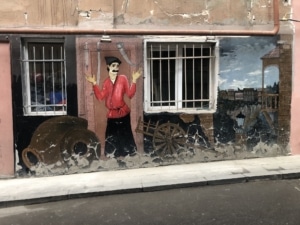
While ezos are a staple of the city that you stumble upon, the real hidden treasures are the entryways you must search for. In different pockets of Tbilisi are several 18th and 19th-century buildings with elaborately painted entryways. The grandeur of these foyers makes me nostalgic for a bygone era that I have never experienced. Each entryway has a story, and I have spent many afternoons scouring the city to find them, often ringing the doorbells of strangers to let me in and snap a picture.
I am always in awe of these ezos and entryways, as they speak volumes about Tbilisi’s cultural evolution over the centuries. They are lasting reminders of the diverse influences that have shaped the city’s identity as well as physical landscape.
The Baths
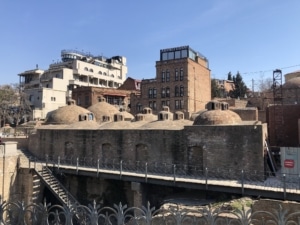
Having lived in Russia briefly, I was no stranger to bath culture when I arrived here. In fact, going to the banya was how I learned Russian, but that is another article for another time. Tbilisi has sulfur baths that well up from natural hot springs. In the Old Town’s Abanotubani area, the scent of sulfur permeates the air, but it’s a minor trade-off for the luxury of bathing in one of the neighborhood’s opulent baths.
What’s best about the baths is their social aspect. Since Tbilisi’s founding in the 5th century, the thermal springs and the baths have played a significant role in the city’s social scene. Whether during the Silk Road period, the turbulent Soviet times, or the current modern day era, the baths have served as hubs for mingling, matchmaking, and making business deals. Today, the baths still allow locals and tourists to get together and talk about anything from puppies to politics.
Food and Wine Scene
There is so much that can be written about Georgian cuisine that I don’t think I can adequately do it justice.
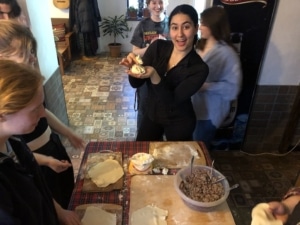
The dishes here reflect the country’s geography and history as residents combine local ingredients with the flavors brought in by the traders who passed through and conquerors who stayed. The wine—varied and abundant—extends far beyond the dining table and permeates across many aspects of Georgian life and tradition. As the country’s culinary heritage grows in popularity abroad, there is much debate about preserving tradition and promoting innovation. In Tbilisi, you have the best of both worlds. Here, you can sample traditional regional dishes in the many traditional cafes while trying new takes at the various fusion places.
Additionally, the city boasts numerous wine lounges offering everything from bio-organic to babua’s (ბაბუა-grandfather) newest vintage in plastic bottles. But, aside from that, the food scene in Tbilisi is more than just restaurants and bars. It is haggling at Dezerters Bazaar for a kilo of walnuts (which play a huge role in the cuisine here), carrying fresh Georgian bread wrapped in newspaper and trying not to burn your hands, and buying midnight shawarma on “Shawarma Street” in Saburtalo—yes, it’s a thing.
What I have found most important in terms of food and wine here, in Tbilisi, or anywhere else in Georgia—is the communal and ceremonial nature of it all. Meals are meant to be shared, and while not all the time, they are often accompanied by elaborate toasts and sometimes even songs. Roles, rules, and rituals are followed, and storytelling is woven throughout. These traditions, deeply ingrained in Georgian identity, can seem almost theatrical, but are unmistakably and deeply genuine.
Why We Stay
Beyond its cuisine and romantic courtyards and baths, Tbilisi is a place of allure for a myriad of reasons. A critical piece of its appeal is connected to its nature as a crossroads—geographically, politically, and ideologically. Living in Tbilisi presently, I have become more aware of what it means to live in this dynamic environment, which is constantly changing but still steeped in tradition. In many ways, Tbilisi is a bit of an anomaly that has attracted and continues to attract people from all walks of life. The city is multicultural, multi-ethnic, and multilingual. Despite this, there is this thread of interconnectedness that fosters in oneself a feeling of being a character in an ongoing and never-dull novel. Tbilisi is a place where an individual, no matter where they are from, contributes in some way to the collective story and thus feels compelled to stick around—
—whether they intend to or not.
Additional Resources
- SRAS Guide to Living in Tbilisi
- SRAS Programs in Georgia
- The Talking Georgian Phrasebook
- GeoHistory Georgia Study Guide
- The Dictionary of Georgian Food
- Faculty Led Programs in Georgia


